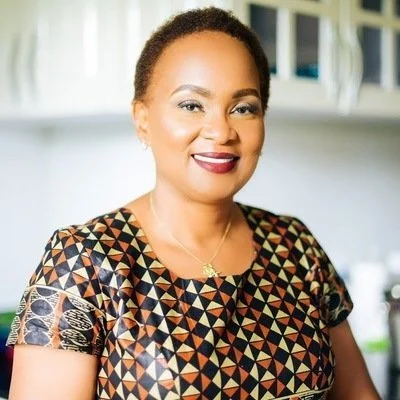Anne Muigai
Anne Muigai has always been drawn to the intersection of creativity and science, using knowledge to solve real-world problems.
Whether it is knitting beanies for premature babies in neonatal ICUs across Kenya or building genetic databases to support African agriculture, her curiosity naturally leads her to innovation.
Today, that same curiosity has taken her to the forefront of academia and science. Muigai serves as the Deputy Vice Chancellor of Academic and Student Affairs at the National Defence University-Kenya and is a key representative of the EBP-affiliated African BioGenome Project. Reaching this point in her career, however, was a journey shaped by unexpected turns and deep-rooted passion.
“I always say genetics found me,” said Muigai.
Muigai began her academic journey at Kenyatta University in Kenya, earning a Bachelor's degree in Education with a focus on Botany and Zoology. Initially, she viewed the degree merely as a stepping stone to pursuing dentistry in the United States.
However, her path took an unexpected turn when she enrolled in an Introduction to Genetics course that sparked a deep interest in the subject. Her professor, an academic descendant of Nobel laureate Barbara McClintock, introduced the class to the concept of mobile genetic elements.
“He spoke of jumping genes and genes that use cellular brooms. I imagined genes as witches, leaping onto brooms and zapping from one cell to another,” Muigai recalls.
Captivated by this fresh perspective, Muigai found herself drawn deeper into genetics, shifting her academic focus and ultimately redefining her career trajectory. Her newfound passion led her away from dentistry and into the world of genetic research.
After earning her bachelor's degree in Education with a focus on Botany and Zoology, Muigai was assigned to teach at a rural school, where she faced the challenge of instructing a classroom of students who primarily spoke the local language, while she herself spoke primarily in English. As the youngest member of the teaching staff and a woman in her twenties, she found herself in a difficult but transformative position. One of the classes she encountered had been left without instruction for months due to their teacher’s illness, and their national examinations were only four months away.
Determined to help, Muigai took on the challenge, teaching them the remaining syllabus in the short time available. Six months later, Muigai received a scholarship to pursue graduate studies in a subject of her choice – plant genetics of course. She returned to the university as a teaching assistant and to her surprise, she recognized several familiar faces in the classroom—students she had once prepared for their national exams had made it to university.
“That was a turning point for me…I wanted to help people become better by giving them an opportunity to do their very best,” said Muigai.
Upon graduating with her master’s, Muigai found herself at a crossroads. With a new baby at home, Muigai wanted to continue her work in plant genomics in Kenya but struggled to find a suitable opportunity.
Life had other plans. Muigai was offered the chance to pursue a PhD in animal genetics—an unexpected shift that felt like a significant leap. Muigai embraced the challenge, setting her sights on molecular population genetics—a path far removed from her original dream of plant genetics, yet one that would define her career in ways she never anticipated.
Muigai’s PhD supervisor had a particular interest in Indigenous animals and the genetics underlying their survival—local chickens, cattle, and sheep that had thrived in African environments for generations. However, these breeds faced increasing threats due to the growing preference for higher-yield exotic breeds.
“If you think about a cow like the Fresian [an international dairy cow breed], they’re big, they’re fat, and they produce a lot of milk. They are very attractive, but to an African smallholder farmer, who is grazing [cows] out in the open, that animal will not be able to survive. It can only survive indoors, as it is kept in Europe.”
Muigai’s research aimed to identify the optimal genetic makeup of Indigenous breeds to ensure the best possible next generation. These animals, naturally adapted to local climates and farming practices, represented the best path forward for sustainable livestock improvement in Africa.
The goal was to identify the optimal genetic breeding pairs to preserve and strengthen these breeds for future generations. However, as the project progressed, a critical gap in knowledge emerged—there were no existing data tracking the distribution of Indigenous breeds across Africa or the number of livestock on farms in various regions. This realization prompted Muigai to shift her focus toward mapping the genetic diversity of Indigenous livestock, with a particular emphasis on sheep. Meanwhile, her colleagues conducted similar research on cattle and goats, broadening the understanding of the genetic diversity of several valuable African livestock species. This groundbreaking work laid the foundation for policies and strategies to protect Africa’s indigenous livestock from genetic erosion.
“It’s fantastic we got started then because we weren't aware that climate change was coming, and for sure, if we had not done that, we would have lost animals that are now ready to survive the challenges that we are facing right now,” said Muigai.
Muigai’s academic journey wasn’t meticulously planned—she often found herself stepping into opportunities as they arose. At just 26 years old, while still pursuing her PhD, she became the youngest member of the Jomo Kenyatta Senate. Though senior colleagues offered advice, it didn’t fully ease the challenges of balancing leadership responsibilities with her personal life. As a woman balancing career ambitions with family life, she had to carve out her own path.
Muigai learned by observing other women in academia. One of her PhD advisors set a powerful example by prioritizing family without compromising professional success—taking time off to be present for her children’s milestones. That approach resonated with Muigai, reinforcing that leadership and family life could coexist.
“Now, as a woman leader, I’m able to better help my students and other ladies around me, as well as gentlemen. I always tell them, ‘Listen, don’t leave everything to your wife. Go home and do something,” said Muigai. Through this, Muigai hopes to guide her students in balancing the responsibilities of being a family man or woman."
Muigai often emphasizes balancing academic pursuits with a fulfilling social life. She regularly checks in with her students, asking about their lives outside of the classroom. She is aware of the pressures within academia, where the competitive nature of the field can make individuals feel as though they are expected to live a certain way.
“Sometimes we scientists have a lingo that makes us understand each other, but if you hang around scientists too much, nobody else outside will understand you so well,” said Muigai.
She wants her students to recognize the community they live in and chase their interests inside and outside of research and science.
Looking back at her own career, the most rewarding chapter is the African BioGenome Project.
“It was a mad idea, brought up by mad scientists, but looking at how far we have been able to go, this crazy idea has actually come to fruition. It’s been the most rewarding because obviously we had no resources, just passion,” said Muigai.
Muigai finds it rewarding to help bring new scientists into the network of African researchers within the African BioGenome Project.
The African BioGenome Project aims to sequence 100,000 genomes across Africa in the next ten years. What excites Muigai most about this initiative is the mentorship programs emerging from the project. AfricaBP is currently providing invaluable support to young African scientists, particularly those in their early and mid-careers, by connecting them with scientists from around the world and offering opportunities for one-on-one mentorship abroad.
Through her work in genetics, mentorship, and leadership, Muigai has remained deeply committed to creating opportunities for others. Whether through her role in the African BioGenome Project, her advocacy for Indigenous livestock conservation, or her efforts to support young scientists, her career has been driven by the belief that knowledge should be shared and used to uplift communities. As she looks to the future, Muigai remains passionate about fostering the next generation of African scientists.
Written by: Maja Peirce (Earth BioGenome Project: Communications & Creative Services Specialist)




